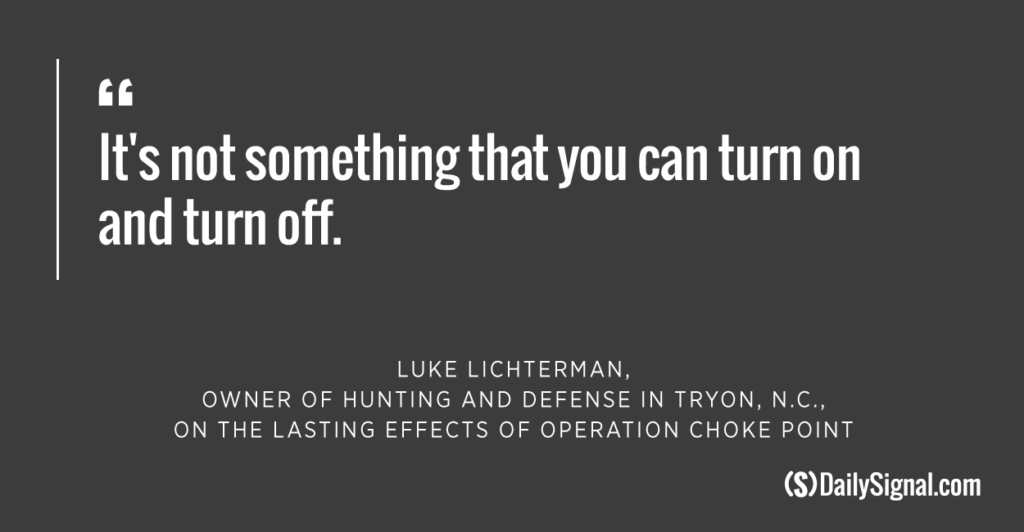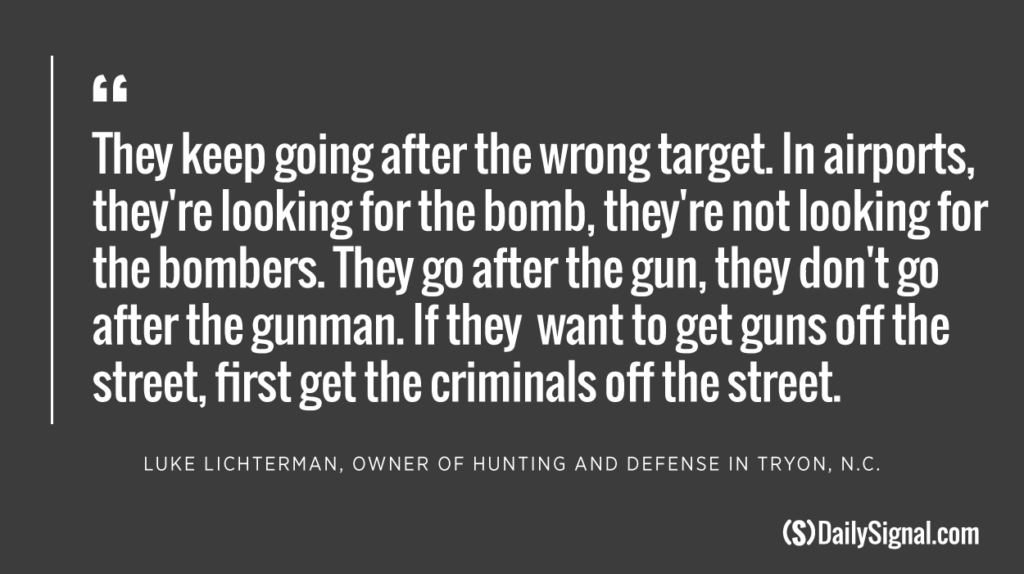Gun Seller Says His Bank Demands ‘Ridiculous’ Information. He Blames Operation Choke Point.
Kelsey Bolar /
A firearms dealer in North Carolina said his bank asked him to reveal “ridiculous and somewhat illegal” information about his business and its customers after the June 12 terrorist attack in Orlando, Florida, and he believes a secretive Justice Department program is to blame.
Luke Lichterman, owner of Hunting and Defense in Tryon, North Carolina, said his bank told him he couldn’t use its services without completing an “addendum” supplying details about his business.
“It all comes back to the Obama administration and Operation Choke Point, the ‘undesirable businesses’ thing,” Lichterman told The Daily Signal. “Something like that from the government has ripples that keep radiating. It’s not something that you can turn on and turn off.”
Lichterman believes that the timing of the request from his bank was no accident, given that gun control once again became a hot issue after the attack on a gay nightclub in Orlando.
The Justice Department launched Operation Choke Point in 2013 to fight fraud. The agency made it more difficult for “high risk” industries to gain access to the banking system, as a way to drive fraudulent industries out of business.
However, critics argue the Obama administration also used Operation Choke Point to intentionally make business more difficult for firearms sellers by categorizing them alongside illegal and fraudulent industries.
>>> Read More: Former Top Obama Executive Says Operation Choke Choke Point Had ‘Collateral’ Consequences
In February, the U.S. House of Representatives passed a bill to end Operation Choke Point. In April, Sens. Ted Cruz, R-Texas, and Mike Lee, R-Utah, introduced a similar measure in the Senate, where it has since stalled.
In the meantime, small business owners from across the country such as the 75-year-old Lichterman continue to complain about the lasting effects of Operation Choke Point.
The Bank’s Original Problem
As The Daily Signal previously reported, Lichterman and his wife had maintained personal accounts at HomeTrust Bank in Asheville, North Carolina, since 2012. But this spring, when Lichterman approached the bank for access to an automated clearinghouse payment service for Hunting and Defense, which operates under the legal name Muttburger Marketing LLC, the bank refused his request.
An automated clearinghouse payment service makes it easier—and cheaper—for business owners to transfer and send money online, allowing them to complete transactions electronically. Without it, Lichterman would be forced to front processing fees at 4.5 percent of every transaction that would eat away at his already slim profits.
In early June, after Lichterman fought back and went public with his story—accusing the bank of participating in Operation Choke Point tactics by discriminating against him because he sells guns—HomeTrust Bank reversed its policy and offered Lichterman an account.
But on June 14, two days after an Islamist-inspired terrorist shot and killed 49 people and wounded 53 others in an attack at an Orlando nightclub, the bank again reversed its policy and told Lichterman he couldn’t use their services without completing an “addendum” demanding more information about his business.
The Daily Signal sought comment about this request from HomeTrust Bank via phone and email, but it did not respond.
The New Demands
Among other demands, the addendum, which Lichterman provided to The Daily Signal, asks Lichterman to “submit a complete list of all firearms and ammunitions vendors and customers” that he conducts business with. In part, it reads:
After the first/initial submission subsequent lists are to include all relevant parties since the date of last report. Each list is to specify personal and business names and associated FFL [federal firearms license] numbers and should indicate whether the individual/entity is new or repeat. The list must identify all firearms and ammunitions transaction entities regardless of whether HomeTrust Treasury Management ACH [automated clearinghouse] origination services are used for the transaction.
The list is due no later than the fifth day of the first month in each quarter.
The new agreement also requires:
- A “complete list of all firearms and ammunitions vendors and customers” that Lichterman did business with.
- A “detailed written document explaining how the business is operated, including procedures in place to screen customers” to ensure compliance with federal regulations, rules, and laws.
- A current copy of the applicable federal firearms license(s).
The end of the agreement enables HomeTrust Bank to request more information:
“[HomeTrust Bank] may request additional information (such as, but not limited to, personal or business financial statements, tax returns, etc.) for the purpose of evaluating your request to obtain or maintain [accounts].”
The Daily Signal publishes the agreement in full at the end of this report.
Christopher Zealand, senior research lawyer for the National Rifle Association’s lobbying arm, described the agreement as highly unusual.
“It’s one thing for a bank to require evidence that a business is operating legally (for example, by requesting copies of relevant licenses, etc.),” Zealand said in an email to The Daily Signal. “It’s quite another for the bank to insist that a federally licensed firearms dealer divulge identifying information about every customer who purchases, or has purchased, a firearm or ammunition.”
The implications, he said, are even more concerning:
Not only is [the information request] logistically problematic, it is an egregious violation of privacy. And to the degree federal banking regulators would have access to these lists, it could also create a workaround to existing laws meant to prevent federal registries of firearm owners.
The Reason
It is unclear whether the demands originate from HomeTrust Bank employees, or the bank’s federal regulators.
HomeTrust Bank is regulated by the Federal Reserve, which would not comment on Lichterman’s specific case or answer broader questions about the requirements and guidelines the agency sets for gun sellers to ensure safe transactions.
Dillon McConnell, a public affairs specialist at the federal Bureau of Alcohol, Tobacco, Firearms and Explosives, which regulates the firearms industry, wrote in an email to The Daily Signal that the bank’s addendum for Lichterman appears to originate from a “private institution.”
McConnell added that while the the Federal Privacy Act prohibits his agency from releasing information about federally licensed firearms dealers, gun sellers are not prohibited from disclosing such information. Aside from applicable state and local laws, private institutions are free to request the information.
If the demands originate with HomeTrust Bank, however, it isn’t clear why the bank requires such information from a customer.
Lichterman said he believes the answer is Operation Choke Point, and the program’s continued effects:
[Under] Operation Choke Point, Obama didn’t write a memo and send it to the bank and say ‘Hey, shut this guy off because he might sell a gun that someday might be used by somebody,’ completely ignoring the fact that it might be used to defend against one of these guys. The thing is, they keep going after the wrong target. In airports, they’re looking for the bomb, they’re not looking for the bombers. They go after the gun, they don’t go after the gunman. If they want to get guns off the street, first get the criminals off the street. They can attack the guys by attacking the people who do business in guns.
Zealand, the lawyer with the NRA, said he agrees.
“The fallout of Operation Choke Point continues,” he said.
Treasury Management Service Addendum Draft – Additional Requirements 06-2016




